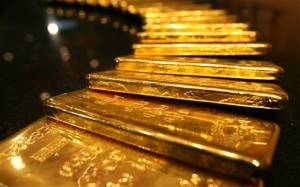 An obscure�loophole allows Tehran to profit while skirting Western sanctions.
An obscure�loophole allows Tehran to profit while skirting Western sanctions.Turkish prime minister Recep Tayyip Erdo?an has arrived in Washington, D.C. for a much-anticipated summit with President Barack Obama. The timing of the visit -- amid reports of chemical weapons usage in Syria and an attack against a Turkish border town by alleged Syrian agents -- will make it hard to talk about anything other than the civil war in Syria.
But some members of Congress want to draw attention to a less-obvious issue. Last month, a bipartisan group of 47 members of Congress�penned a letter to Secretaries John Kerry and Jack Lew�calling for clarification on Turkey's financial dealings with Iran. Under the initiative of South Carolina Republican Representative Jeff Duncan, the letter expressed deep concerns over Turkey's gold dealings that have helped Iran skirt Western sanctions designed to curtail Tehran's illicit nuclear program.
In February 2012, the�Wall Street Journalreported that Turkey's state-owned bank, Halkbank, was processing "payments from third parties for Iranian goods." This included "payments for Indian refiners unable to pay Tehran for imported oil through their own banking system for fear of retribution from Washington." Separately, the�Journal�also reported that the Turkish bank was responsible for many of Turkey's "gas-for-gold" transactions with Iran despite an executive order issued by the Obama administration prohibiting gold payments to the government of Iran. As Turkey's�Deputy Prime Minister Ali Babacan�frankly admitted, Turkey's "gold exports [to Iran] end up like payments for our natural gas purchases."
The system was simple. As�Reuters�notes, Turkey purchased Iranian natural gas in Turkish lira, and transferring the proceeds to Halkbank accounts. Iranian gold traders then accessed the funds to buy gold in Turkey, which was subsequently carried in luggage to Dubai, and then sold for foreign currency to help sure up Tehran's dwindling foreign exchange reserves.
Remarkably, it was legal under the current sanctions regime, as long as the Obama administration couldn't prove that Turkish gold payments were made to the government of Iran (which strained credulity given Turkey's public admissions that they were selling gold to Iran in exchange for Iranian energy).
To plug this loophole, the Obama administration on January 13, 2013, put in place new legislation that imposed a blanket prohibition on all gold sales to Iran. However, the administration requested that the sanctions only become effective after six months, thereby granting Turkey and other countries a six-month exemption from the tougher gold sanctions, which is now set to expire on July 1, 2013.
With the window still open, according to�Iran's state-owned Press TV, Turkey and Iran reportedly completed a $120 million gold deal within days of the announcement. According to�Hurriyet�, Turkey's gold exports to Iran rose twofold in March, totaling some $381 million. According to a report by Foundation for Defense of Democracies and Roubini Global, "�Iran's golden loophole" has allowed Iran to receive over $6 billion since July 30, 2012, when the administration could have started prohibiting Turkish gold sales. In the first quarter of 2013 alone, Iran has received $1.3 billion in gold payments, either directly from Turkey, or through the UAE.
Turkey, in other words, has milked the gold trade with Iran for all it has been worth. Only recently has Turkish Minister of the Economy�Zafer Caglayan�hinted at a possible "decline in demand for gold" from Iran.
But the challenge of Turkey's illicit finance activity doesn't end there, so far as legislators are concerned. Last month's letter also voiced concern about Erdo?an's support for Hamas, an Iran-sponsored terrorist group. Turkey is now also considered to be one of the primary patrons of the violent Palestinian faction. One unconfirmed�report in late 2011suggested that Erdo?an's government sent "$300 million to be sent to Hamas' government in Gaza." Whether or not that money arrived, other Turkish cash has flowed to Hamas forhospitals,�mosques�, and�schools�in the Gaza Strip. Turkey is also the home of Hamas rising star�Saleh al-Aruri, who is said to be in charge of�Hamas' operations in the West Bank.
Following Erdo?an's trip to Washington, the Turkish leader is�slated to visit the Hamas government�in Gaza. Should he follow through, he will be only the second head of state to visit the Palestinian enclave ruled by Hamas.
Secretary of State John Kerry openly objected to Erdo?an's Gaza visit, but he has yet to respond to the congressional letter that requested "information about the efficacy of Turkish measure to support sanctions on Iran and prevent funding of terrorist organizations."
For its part, Halkbank responded to the congressional letter in the�Turkish newspaper�Hurriyet�, denied all wrongdoing, and lambasted the "pro-Israel lobby" for the letter.
Duncan, in the meantime, affirms that he has "been in touch with the Embassy of Turkey. I expect our conversations to continue on this issue, and I believe that the U.S. and Turkey must work better together to prevent Iran from evading sanctions." Duncan added that his sessions were "frank" and "productive."
With Erdo?an's arrival this week, some members of the House Foreign Affairs Committee may greet him with changes to the�Iran Nuclear Prevention Act�to help close the Turkey loophole.
The White House, however, will likely not address this issue - not publicly anyway. The public policy discussion will remain focused on the U.S.-Turkish alliance and solving the problem of Syria.
Of course, Syria's top Middle East patron is Iran, which continues to benefit from trade with Turkey, until U.S. waivers cease and this loophole is closed.
By The Atlantic
The Iran Project is not responsible for the content of quoted articles.










